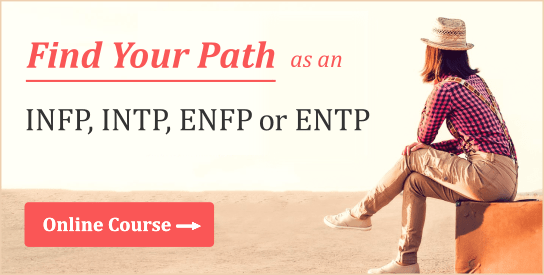In my work and experience as a typologist, the most common source of type confusion is the J-P variable, an issue which I’ve addressed in my book, My True Type, as well as in various online articles, such as Rethinking Judging & Perceiving. I’ve also written posts on INTJ vs. INTP and INFJ vs. INFP differences, but have yet to invest significant time writing about INTP vs. INFP similarities and differences.
As is true with other type comparisons, the INTP and INFP are at once strikingly similar and profoundly different. If we take a surface-level view, we quickly see that these two types share three preferences in common—introversion (I), intuition (N), and perceiving (P)—and differ only in their T-F preference. If we look a little deeper, we learn that they also share important commonalities in the realm of the functions:
In comparing INPs’ function stacks, we see that both types use Ne and Si as their auxiliary and tertiary functions. Moreover, both use an introverted judging function (Ti or Fi) as their dominant function and an extraverted judging function (Fe or Te) as their inferior. Simply put, the overall structure of these two personality types is strikingly similar.
Self-Direction (Fi / Ti)

As touched on in my post, Introverted Feeling (Fi) vs. Introverted Thinking (Ti), both Fi and Ti use a subjective approach to judging, that is, their preferred evaluative criteria derives from the self rather than from external sources. Both Fi and Ti make independent subjective judgments, the validity of which is experienced as self-evident. They are thus relatively unconcerned with the degree to which others agree with their methods or conclusions.
The upshot of this is that both INTPs and INFPs are apt to be idiosyncratic and unconventional. Both types exhibit a deep concern for staying true to themselves—their own ideas, interests, values, and methods—rather than blindly conforming to world around them. The appearance of adaptability conferred by their P preference belies their inner craving for authenticity and self-direction. The idea that INPs are spontaneous with respect to the outside world is in many respects fallacious. They may be spontaneous in responding to their own inner impulses, but they are inclined to avoid or flee from externalities that have the potential to disrupt the peace and comfort derived from following their own inner compass (which is why many INPs, especially INFPs, score high as Enneagram Nines).
Part of being a self-guided individual is clarifying one’s beliefs, values, and identity. This is why INPs invest so much time working to understand themselves and figure out what they believe; in order to effectively be themselves, they must first know themselves. This of course is where typology often proves useful, furnishing insight into the essential nature of their personality.
Seeking & Creating (Ne)
While Fi / Ti compels INPs to clarify and hold true to their own path, their auxiliary function, Extraverted Intuition (Ne), prompts them to explore external ideas and possibilities that inform, enrich, or otherwise interface with that path. Indeed, even the most introverted INPs eventually tire of running around in their own minds and feel compelled to redirect their gaze outward. Not only is Ne keen to entertain and absorb circulating ideas, but it excels at seeing patterns and connections among those ideas. Exploring new ideas and possibilities can be deeply refreshing and invigorating for INPs, particularly after extensive periods of solitude or self-absorption. In many respects, Ne functions like a “reset button” for INPs, removing their introverted blinders and offering them a fresh set of ideas to explore.
Ne can also have the effect of opening up or casting doubt on previously established judgments, which can be both a blessing and a curse for INPs. On the one hand, INPs appreciate the novelty and refreshment that Ne can bring. On the other hand, Ne is a potent destabilizer, injecting doubt, even chaos, into INPs’ self-understanding and worldview. As discussed in my post, INTPs’ & INFPs’ Quest for Convergence & Certainty, INPs who regularly employ Ne discover that, however earnest their attempts, ideational certainty perpetually eludes them. When it comes to Ne, there is only one thing one can be certain of: uncertainty.
Because of the divergent and unpredictable nature of Ne, INPs are best understood as seekers and creatives rather than as knowers or doctrinaires. In my view, this is one of the most important things INPs can understand and embrace about themselves. Among other things, it can help them let go of the idea that, in order to be successful or move forward with their lives, they must first arrive at firm answers to all their questions. Put differently, self-identifying as seekers / creators helps INPs avoid the pitfalls of what we might call “NJ envy,” that is, of trying to operate as convergent knowers.
INTP vs. INFP Approaches to Growth
As discussed in my book, The 16 Personality Types, all types struggle to effectively navigate the tensions and power struggles transpiring among their four functions. Of particular salience is the struggle between the dominant and inferior function, which represents the greatest power imbalance within the function stack.
Because INTPs’ dominant function is Ti, they often feel disconnected from the world of feeling, as well as the sense of meaning that feeling confers. Hence, one of their deepest fears is that life will prove to be utterly meaningless and that they will thus be condemned to a nihilistic existence. To assuage this fear, the psyche prompts INTPs to engage with the F world, be it through interpersonal relationships or in less direct ways, such as exploring subjects like philosophy, psychology, literature, religion, etc.
The INFP’s deepest fear is in many respects the opposite of the INTP’s. Rather than being disconnected from F matters, the INFP feels estranged from, or insecure about, the world of T. INFPs tend not to fret about life lacking meaning or value, but about things like structure and organization, time and financial management, and other logistical matters. In attempt to overcome their T shortcomings, they commonly take interest in subjects like math, science, computers, engineering, law, finance, accounting, etc. Doing so helps temper their T concerns, reassuring them that psychological wholeness is within reach and that they will never be cut off from their Te function.
That being said, we know that not all INPs pattern their careers around the needs and desires of their inferior function. In reality, we may find similar numbers of INTPs and INFPs in both the sciences and humanities. However, I suspect that INTPs studying the humanities are more likely to mistype as F types, and vice-versa for INFPs in the sciences. Both types may see themselves as more capable with respect to their inferior function than they actually are. This is just one of many ways in which the inferior function can generate type confusion among INPs, causing them to mistake a dream (i.e., having a developed and reconciled inferior function) for reality. Of course, this is not to say that these types cannot grow and develop their inferior functions, but only that their self-assessments are often skewed by inferior function ideals.
There are at least a couple ways INPs may approach the challenge of integrating their dominant and inferior functions. The lowest hanging fruit is to use a piecemeal approach, attempting to satisfy both functions separately, as commonly seen in Phase II of type development. INTPs taking this approach will often try to satisfy their Fe through a relationship and their Ti through some form of self-directed work. Similarly, INFPs may satisfy their Fi by caring for children or pets, while simultaneously working to advance their career (Te).
An alternative route to reconciling the dominant and inferior functions is by employing and developing what we might call the “bridge functions” (i.e., the auxiliary and tertiary functions), which are sandwiched between the dominant and inferior functions in the function stack. As we’ve seen, these functions are identical for these two types. Thus, INPs hoping to build a bridge between their dominant and inferior functions, which in my view is a more effective and sustainable route to individuation, will share a lot in common.
Perhaps the most important function with respect to INPs growth and development is Ne, the function of exploration and creativity. Rarely is it clear to INPs exactly how Ne can move them toward psychological wholeness. This lack of clarity, in combination with the destabilizing effects of Ne, helps us understand why letting go of the piecemeal approach can prove difficult for INPs. So despite the fact that building an Ne-Si bridge is a more reliable route to integration and wholeness for INPs, it requires a greater measure of faith, patience, and courage, since the inferior function is being approached in a more subtle and less direct way.
This harkens back to my earlier point about INPs self-identifying as seekers / creators (Ne) vs. convergent knowers. Seeing themselves as knowers would be suggestive of identification with their inferior extraverted judging function (Fe or Te). But the truth is that INPs can’t authentically reach a point of knowing without first employing their top three functions. Before they can know anything with confidence, they must introspect (Fi / Ti), explore related ideas (Ne), and consider past information (Si). Not only that, but knowing often proves to be less rewarding for INPs than the process of seeking and creating—something they may not realize until the dog actually catches its own tail. Little is more deflating for these types than the sense that there is nothing more for them to explore or create. This sentiment is nicely captured in Dostoevsky’s Notes from Underground:
Man loves creating…But why does he so passionately love destructions and chaos as well?…Can it be that he has such a love…because he is instinctively afraid of achieving the goal and completing the edifice he is creating? How do you know, maybe he likes the edifice only from far off, and by no means up close; maybe he only likes creating it, and not living in it…
If you’re an INFP or INTP and would like to better understand your personality, life purpose and more, we encourage you to explore our new online course, Finding Your Path as an INFP, INTP, ENFP or ENTP:
Related Posts:
Introverted Thinking (Ti) vs. Introverted Feeling (Fi)
The Inferior Function: An Overlooked Personality Factor
Related books:
My True Type: Clarifying Your Personality Type, Preferences & Functions
The INTP: Personality, Careers, Relationships…(#1 INTP book on Amazon)


Gregory Kozloff says
Dr. Drenth,
This is one of then best posts I have ever read of yours and goes far to explicate my INTP-INFP uncertainties. While I am in my late 60’s I’ve integrated my functions to some degree but still have some difficulties accessing my feeling function, illusion, denial and currently growing awareness of how much feeling has impacted my decisions. I truly live the uncertainties. Thank you very much.
PS This goes some lengths (though not totally) to restore my belief in MBTI.
Gregory Kozloff says
I still test as INTP but wonder yet whether I was socialized into it (as a male) rather than born as it — I know this is not supposed to change in a lifetime.
Bill M. says
Verrrrry interesting… since I formally tested as INTP/INFP … with the T-vs.-F dimensions virtually identical: 49/51%. I don’t recall which came out on top; with that narrow outcome, I choose to think it’s essentially a tie. (Hmm, perhaps the fact that I CHOOSE TO THINK that… means that the “51” is the “T”, not the “F.”)
(Now I’ll go back and read your assessment in more detail ;) )
P.S. And, Gregory Kozloff … since I just entered my “late 60s” two months ago; I choose to think I’m not old yet ;)
Nigel says
“Similarly, INFPs may satisfy their Fi by caring for children or pets, while simultaneously working to advance their career (Te).”
Would like to unpack this statement a bit more. My sense of introverted feeling is that it would fuel an orientation toward 1) the act of meaning-making, or 2) activiities that affirm, express, or enact one’s meaning or values. Would caring for children or pets necessarily satisfy Fi? Or would that be more of an Fe activity?
Dan says
Anybody else but me pretending you don’t have the desire to go back and get a refund on some of your life? LOL My receipt is long gone. (How do INTPs end up as school teachers, anyway? How the hell does that happen? My, how I endeavored in and severely succeeded in an unequivocal and irrecoverable, not to mention enormous waste of time.) Can’t say I missed the boat. Just showed up on time with my bags packed and ready for the wrong one, I guess. Wow.
Michele says
Thanks for that so great quotation of Dostoevsky :)
I usually test as 60-70% INTP and 30-40% INFP, but I think I am more of an INFP.
I am good at puzzles and love to have my mind engaged by logical conundrums, but I am much better at writing and reading, handling words.
As for word-dom, I prefer adjectives and sentiment-describing words and a constantly variable, irregular phrase structure to more systematic non-fictional works.
However, my love of (continental!) philosophy and non-fiction scientific works (so long as they have a philosophical tone. I can feel no interest in anything concretistic) is true too.
And if I could impose my will on the world (something that both serious feelers and thinkers can’t help but have a wish for), the first value would be mercy, the second evenness and objectivity.
This means I am more of an INFP, but an INTP too.
INTPs and INFPs are the people who have a harder time reaching psychological balance, I think. But also those who achieve the broadest, deepest view of the world.
Honor et onus, as the Roman said.
amber says
Hello and thanks so much for your work, I got really into this and read a lot about it, but got a lot of Intuitions and questions about it. Luckily I found this website because you really provided me with answers. Like for example, I am probably enfp and my brother estj and I started doubting him to be because we can talk very intuitively together, but because of your explanation of the package and the inferior functions and how we always communicate with the extraverted functions and that can be confusing in typing someone I understand this issue and a lot more.
This article I find really good as well. My boyfriend first got infp and later intp which probably fits better. But he did do a human study as you say here happens often. Really well explained, also the building of a bridge part.
Will you also make an article on infp vs enfp? me and a lot of other enfps seem to be uncertain about the difference, is there really any, we are very introverted for extraverts and they are very social for introverts. But ofcourse the order of the functions makes a big difference. The personal quest for wholeness. But I am confused after reading this because I have also a very big fear for money and organization stuff. But I don’t try to get good at it, I more avoid as much as possible to be honest.